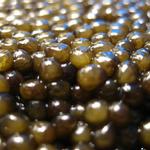Corruption and Wildlife Crime: A Focus on Caviar Trade
Produced by TRAFFIC, WWF, U4 Anti-Corruption Resource Centre (U4 ACRC), Northumbria and Utrecht Universities, "Corruption and wildlife crime: A focus on caviar trade" examines how corruption facilitates the flow of illegal caviar along the value chain, to identify possible intervention strategies. The study identifies a range of corrupt practices, ranging from bribery of border officials, poachers painting marks on their fishing boats to show police officials they had paid bribes to avoid inspection, the abuse of scientific fishing permits as a cover to legalise catch of wild sturgeon in the Caspian Sea, and even "black washing" - the misdeclaration of legally farmed caviar as "wild-sourced" because of the higher price that attracts. The authors describe the latter as "a unique corrupt practice for wildlife crimes, and possibly unique to the caviar industry."
David Aled Williams

